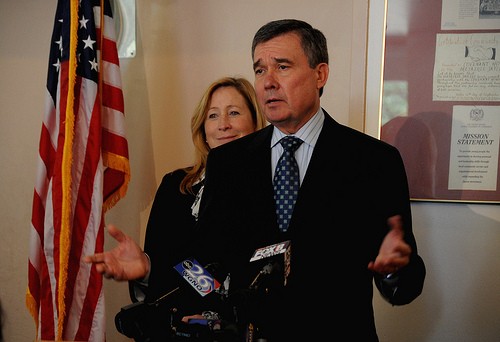Overdose Drug Gains Support in Whitehouse

Director of the Office of National Drug Control Policy Gil Kerlikoweske acknowledged the effectiveness of anti-opioid-overdose drug naloxone yesterday, calling for it to me made more widely available to emergency-care providers and first responders.
The drug, which gained attention after a New York police officer was able to save a life with it last month, is an emergency treatment administered via nasal spray. Naloxone has been proven in numerous clinical trials to quickly reverse an opioid overdose and began seeing limited use in some states back in 2006.
Still, many lawmakers are arguing that the potentially life-saving drug is not getting the attention it deserves. New York state, one of the few states where naloxone has gained traction, currently only uses the drug largely in Staten Island, where the mortality rare for overdose is nearly 35 percent higher than the rest of the city. Currently, only 190 police officers and a smattering of first responders have been trained to use the drug on overdose victims.
In a recent press conference-call, Kerlikowseske, popularly called the White House's "drug czar," applauded Boston Mayor Marty Walsh's decision Tuesday to expand naloxone availability to firefighters and police officers in the greater Boston area.
But, he continued, New York, Massachusetts and the 15 other states that currently employ some use of the drug are not enough. Besides increasing access to naloxone, Kerlikowseske is also asking states to adapt "good Samaritan" laws to provide immunity from criminal prosecution to individuals who call for emergency help during an overdose.
Efforts to curb overdose death rates has recently gained traction among lawmakers after the death of award-winning actor and director Philip Seymour Hoffman, who recently died of a heroin overdose alone in his New York apartment.
But not all lawmakers are keen to jump on the bandwagon. Maine Governor Paul LePage, for instance, is opposed to use of naloxone in his state because he suspects the knowledge that they can be saved from a fatal overdose may actually encourage substance abusers to risk overdose in pursuit of a greater high.
New Jersey Governor Chris Christie once similarly shared LePage's reservations against the drug, but recently changed his mind, signing a law that permitted the use of the treatment in his state last May. He wrote in an official statement with the bill, "We want to save a life first... I would rather you didn't do [drugs] in the first place, but I live in the real world."
Feb 12, 2014 12:16 PM EST





